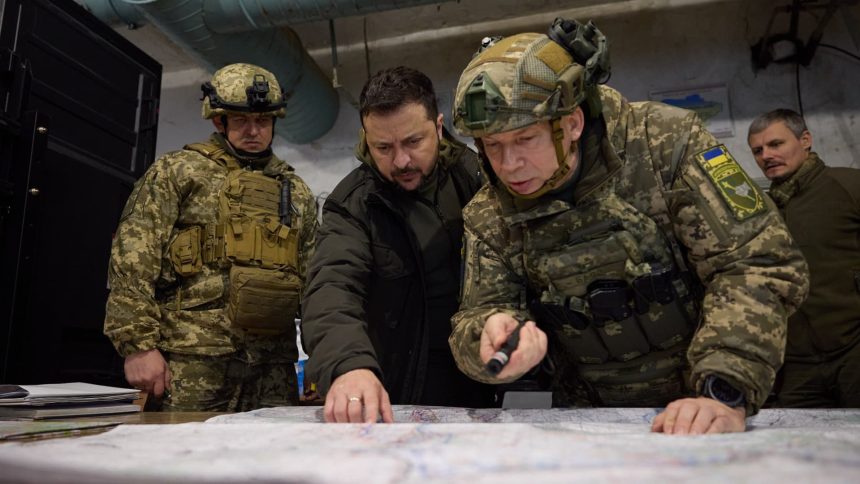Britain to continue supporting Ukraine ‘for as long as it takes’: Foreign secretary
British Foreign Secretary David Cameron said Tuesday that the country would continue its support for Ukraine.
“We will continue to support Ukraine for as long as it takes,” he told the House of Lords during a monthly question session. Since February 2022 the U.K. has committed to economic and humanitarian support worth more than £4.7 billion ($5.9 billion) to Ukraine, Cameron noted.
Cameron also said the level of support for Ukraine would remain the same, or even be enhanced, going forward.
— Sophie Kiderlin
The war leaves its mark on Avdiivka
Traces of the war can be seen in Avdiivka, a city in eastern Ukraine near Donetsk, which has been a fiercely contested fighting hotspot throughout the conflict.
Russia repeats that it’s ready for negotiations with Ukraine
Moscow has repeated that it’s ready for talks with Ukraine, with the Kremlin’s spokesman claiming Russia would prefer to negotiate through “political and diplomatic means.”
“The President has repeatedly said that the main thing for us is to achieve our goals [in Ukraine],” Kremlin Press Secretary Dmitry Peskov told RTVI, Russian state news agency Tass reported.
“And, of course, we would prefer to do this primarily through political and diplomatic means. That’s why we remain ready for negotiations.”
Peskov again reiterated Moscow’s criticism of Ukraine for pulling out of previous negotiations. Kyiv has said it won’t hold talks with Moscow while Russian troops remain on its territory.
The Kremlin representative also commented on a report in the Izvestia newspaper, which stated that negotiations between Moscow and Kyiv could resume on the territory of one of the Western countries — for example, in Hungary. Peskov said that the idea could theoretically materialize.
— Holly Ellyatt
Zelenskyy, top U.S. officials to make case for Ukraine funding
Ukraine President Volodomyr Zelenskyy and top aides to U.S. President Joe Biden will make their case to U.S. senators on Tuesday about why a fresh infusion of military assistance is needed to help Ukraine repel Russian invaders.
U.S. officials say the United States will spend all it has available for Ukraine by the end of the year, a dire prediction that comes as Kyiv has struggled to make major advances in its 2023 counteroffensive against Russia.
Biden’s administration in October asked Congress for nearly $106 billion to pay for ambitious plans for Ukraine, Israel and U.S. border security, but Republicans who control the House with a slim majority rejected the package.
Senate Majority Leader Chuck Schumer, a close Biden ally, announced on Monday night that the administration has invited Zelenskyy to address senators via secure video as part of a classified briefing on Tuesday “so we can hear directly from him precisely what’s at stake in this vote.”
In addition, a variety of top Biden officials, including Defense Secretary Lloyd Austin and Secretary of State Antony Blinken, are expected to brief the senators on Tuesday.
Zelenskyy told Reuters in a November interview that despite the slow going, Ukraine would try to deliver battlefield results by the end of the year and that he remained sure Kyiv would eventually have success in the war despite difficulties at the front.
But the stalled drive to get U.S. assistance has alarmed the Biden White House, which fears a failure to help Ukraine further would increase the likelihood of Russian victories.
— Reuters
Russians making ‘creeping advances’ around Marinka in Donetsk
Over recent weeks Russian forces have made “creeping advances” through the ruins of Marinka, a front line town in Donetsk in eastern Ukraine, the U.K.’s defense ministry noted Tuesday.
“Russia now likely controls most of the built-up area. However, Ukrainian forces remain in control of pockets of territory on the western edge of the town,” the ministry said on X, formerly known as Twitter.
“Marinka has been on the front line since 2014. With a pre-war population of 9000, it is comprehensively ruined – drone footage suggests that the vast majority of buildings have been reduced to rubble,” the ministry added.
Russia’s renewed efforts against Marinka are part of its recent offensive in which it is “prioritising extending Russia’s control over the remaining parts of the Donetsk Oblast [region] – highly likely still one of the Kremlin’s core war aims,” the U.K. said.
— Holly Ellyatt
Finland eyes significant increase in artillery production for Ukraine
Finland could soon produce a “significant” amount of artillery ammunition for Ukraine, according to the country’s Defense Minister Antti Häkkänen.
“The plans are ready … to increase ammunition production in a significant way,” he said in a Google-translated interview with the Iltalehti newspaper, adding that “the purpose is to support Ukraine even more strongly than now.”
Häkkänen said that a decision on production would be made “very soon, probably before Christmas.”
Finland was the latest country to join the Western military alliance NATO earlier this year, ending decades of military non-alignment.
Helsinki approved its 20th military aid package, worth around 100 million euros ($108.1 million) for Ukraine in November. It brings the total amount of aid provided to Kyiv to around 1.5 billion euros.
— Holly Ellyatt
Ukraine says it downs 10 of 17 Russian drones during overnight attacks
Ukraine’s military shot down 10 out of 17 attack drones launched overnight by Russia, Ukrainian authorities said on Tuesday.
The governor of Ukraine’s western Lviv region said three drones had struck an unspecified infrastructure target, but damage had been minimal and no casualties had been reported.
Authorities in eastern Ukraine’s Kharkiv region said drones had struck private homes and residential buildings, among other civilian targets, in at least two different settlements.
Kyiv’s air force said the drones were shot down over “various regions” of the country.
It said six S-300 missiles had also been launched at civilian targets in the eastern Donetsk and southern Kherson regions.
Russia has repeatedly denied targeting civilians in Ukraine, but says the country’s energy infrastructure is a legitimate military target.
— Reuters
Kyiv’s mayor criticizes Zelenskyy, agrees that war has reached a ‘stalemate’
Kyiv Mayor Vitali Klitschko told a Swiss media outlet that he agreed with a recent assessment made by the Commander-in-chief of the Armed Forces of Ukraine Valery Zaluzhny that the war had “reached a stalemate.”
Zaluzhny told The Economist magazine last month that the conflict had “reached a stalemate” and a “deep and beautiful breakthrough” looked increasingly unlikely. The comments reportedly caused controversy between the military chief and Ukraine’s President Volodymyr Zelenskyy, who disputed the characterization of the state of the war.
Speaking to Swiss publication 20 Minuten over the weekend, Kyiv Mayor Klitschko said Zaluzhny had “told the truth.”
“Some may not want to hear the truth [but] we can’t lie to our people and partners indefinitely,” he said.
Klitschko also criticized Zelenskyy, saying the president’s popularity had declined because “people see who is effective and who is not. And there were and are many expectations. Zelenskyy is paying for the mistakes he made,” he said.
When asked what mistakes Zelenskyy had made, Klitschko said Ukraine had not been prepared for the war.
“People wonder why we weren’t better prepared for this war. Why Zelenskyy denied until the end that it would happen. Or why it was possible that the Russians were able to reach Kyiv so quickly,” he said.
Despite the criticism, Klitschko said the president “has an important function today and we must support him until the end of the war. But at the end of this war, every politician will pay for his successes or failures.”
The criticism of Zelenskyy comes amid questions about the 2024 election in Ukraine. The president and his advisors have rebuffed the notion of holding a vote when the war is ongoing (and elections are prohibited during times of war in Ukraine) but Kyiv wants to burnish its democratic credentials as it looks to join Western blocs, such as the EU.
— Holly Ellyatt
Putin to visit Saudi Arabia and the UAE on Wednesday; receive Iran’s president on Thursday
Russian President Vladimir Putin will on Wednesday visit Middle East allies Saudi Arabia and the United Arab Emirates, before receiving Iranian President Ebrahim Raisi in Moscow the day after.
The Kremlin announced the scheduled meetings, according Reuters and Google-translated comments reported by Russian state news agency Tass on Telegram.
Putin previously visited Saudi Arabia and the UAE in October 2019, according to Tass. It is unclear if the Russian leader will formally attend the U.N.’s COP28 climate conference, which is taking place in major UAE hub Dubai until Dec. 12.
Putin has been selective in his foreign travel since the March issuance of an International Criminal Court arrest warrant over his alleged responsibility for the unlawful deportation and transfer of children during Moscow’s war in Ukraine. Saudi Arabia and the UAE have yet to ratify the Rome Statute that defines the ICC’s purview.
The Kremlin specified that Putin’s engagements in Saudi Arabia and the UAE will discuss topics including the oil market and the Israel-Hamas conflict.
Moscow, Riyadh, Abu Dhabi and Tehran are policy-setting partners in the OPEC+ oil producers’ alliance, and Putin’s visit comes amid an ongoing slump in oil prices that the Thursday announcement of a spate of voluntary supply cuts have so far failed to resuscitate. The three Middle Eastern countries were also invited to join the Russia and China-led BRICS bloc of emerging markets in August.
Initially more restrained in its criticism of Israel, Russia has since joined the three Middle Eastern countries in expressing concern over casualties in the Gaza Strip throughout the Israel-Hamas conflict. Iran outright sponsors the Palestinian militant group, but denied involvement in its terror attacks of Oct. 7.
— Ruxandra Iordache
Two killed in Russian strike on Ukraine’s Kherson
At least two people were killed and three wounded after Russian forces shelled the southern Ukrainian city of Kherson, authorities said on Tuesday.
Regional prosecutors opened a war crimes investigation into one of the strikes, which occurred around 9 a.m. and killed a 48-year-old man and a woman who had not yet been identified.
“Terrorists,” Andriy Yermak, the head of Ukraine’s presidential administration, posted on Telegram along with two images of bodies laying on a sidewalk.
Kherson Mayor Roman Mrochko said two doctors had been wounded in a separate artillery strike on a medical facility early on Tuesday.
Reuters could not independently confirm the details of either incident. Russian forces have regularly shelled Kherson since retreating from the regional capital late last year to the other side of the Dnipro River.
— Reuters
Around 300,000 Russian personnel likely wounded or killed in war, UK says
Britain’s Ministry of Defense estimated that official Russian Ministry of Defense forces have likely suffered between 180,000 and 240,000 personnel wounded and approximately 50,000 killed since the start of the war in February 2022.
Mercenaries fighting within the private military company known as the Wagner Group have likely suffered approximately 40,000 wounded and 20,000 killed, it added in an intelligence update Monday.
“Therefore, overall, the Russian side has likely suffered around 220,000-280,000 wounded and approximately 70,000 killed,” the ministry said on X, formerly known as Twitter.
“This gives an estimated range of between 290,000 and 350,000 total Russian combatant casualties.” The median of the estimate range is 320,000 total Russian combatant casualties, it noted.
“Even amongst Russian officials there is likely a low level of understanding about total casualty figures because of a long-established culture of dishonest reporting within the military.”
Accurate casualty numbers are impossible to obtain given the chaotic nature of the war and secrecy on both sides over the number of personnel they have lost, respectively. Meanwhile, both sides have an incentive to exaggerate the losses they say they’ve inflicted on each other.
— Holly Ellyatt
Debates on Ukraine’s EU membership to start Tuesday
Envoys of the European Union’s member countries are set to start debating a proposal to begin membership talks with Ukraine on Tuesday, Reuters reported, citing officials and diplomats.
The discussions are part of the preparations for the European Council meeting on Dec. 14-15, when leaders are set to consider potential EU accession for countries including Ukraine, Moldova, Georgia and Bosnia.
A draft agreement on potential accession talks is set to be debated Tuesday and is expected to change following discussions, diplomats and officials said.
— Sophie Kiderlin
Ukraine is changing its strategic tactics, presidential aide says
Ukraine is shifting its military tactics as a result of the arrival of winter and an analysis of Russia’s resource capabilities, presidential adviser Mykhailo Podolyak said Monday.
Writing on X, formerly Twitter, Podolyak said: “On the frontline and in the cities, we are already moving to a different tactic of warfare – effective defense in certain areas, continuation of offensive operations in other areas, special strategic operations on the Crimean peninsula and in the Black Sea waters, and significantly reformatted missile defense of critical infrastructure.”
Resources will be directed to increasing domestic arms production and speeding up negotiations with allies to increase equipment supplies for the “new stage” of Ukraine’s offensive operations, he said, particularly missile defense systems, long-range missiles, drones, and electronic warfare systems.
Russia has increasingly focused on drones this year, Podolyak added.
This year has also seen numerous reports of drones being shot down by Russia.
— Jenni Reid
Bulgarian president blocks delivery of armored transport vehicles to Ukraine
Bulgarian President Rumen Radev on Monday blocked a deal, signed in August, that would have provided armored transport vehicles to Ukraine, news agency Novinite reported.
Radev said parliamentarians did not fully understand the specifics of the donation, and that the vehicles could play a role in safeguarding Bulgaria’s borders and aiding its own citizens in emergencies, according to Novinite.
He also said that recent floods that required military support showed the need for increasing, rather than reducing domestic supplies.
The agreement will now return to parliament for further debate.
It comes as Ukrainian officials stress their need for reinforcements amid struggles to make progress in occupied areas, and as frontline fighting progresses into winter.
The White House on Monday warned that the U.S. will no longer be able to provide additional military equipment to Ukraine by the end of the year, unless Congress approves further funding.
There are also rumblings of discontent over support for Ukraine within the European Union. Hungarian Prime Minister Viktor Orban has threatened to block all EU funding for Ukraine unless the coalition holds a review of its strategy, while Slovakia’s new Prime Minister Robert Fico has suspended the provision of all military aid.
— Jenni Reid
White House says Ukraine funding will run out soon without congressional approval
A senior White House official on Monday warned that the U.S. would run out of resources to supply Ukraine with more weapons and equipment by the end of the year unless Congress approves additional funding.
“There is no magical pot of funding available to meet this moment. We are out of money—and nearly out of time,” Shalanda Young, director of the Office of Management and Budget, said in a letter to congressional leaders.
Young said cutting off U.S. supplies would “kneecap Ukraine on the battlefield,” risk it losing gains already made and increase the likelihood of Russian military victories.
U.S. packages of security assistance and aid deliveries have already become smaller, she said.
Congress has so far approved $111 billion in supplemental funding for Ukraine, by far the largest such support of all Ukraine’s allies, but the issue has become increasingly contentious in the U.S. legislature.
President Joe Biden has expressed staunch support for Ukraine and the continuation of U.S. support, and in October the White House requested more than $105 billion from Congress for security needs across Ukraine, Israel, Taiwan and the U.S. southern border.
Young said Monday that support for Ukraine would advance domestic national security interests by preventing larger conflict in the region that could involve NATO and U.S. forces, and by deterring future aggression.
— Jenni Reid
Russia trying to capture Avdiivka ‘at any cost,’ Ukrainian official says
Russian forces have launched new fronts in the fierce battle for Avdiivka in the Donetsk region, an Ukrainian official noted.
“The current third wave of enemy assaults differs from the previous two in that they have conditionally opened two new directions,” the head of Avdiivka’s military administration, Vitaliy Barabash said. “The launching of new directions proves that the enemy has been given a command to capture the city at any cost.”
In comments to state media, Barabash said these latest events were an attempt to distract Ukrainian defences and close a gap west of the town that would see it entirely encircled. Independent military analysts have said that about 1,300 civilians remain in the town, which was once home to about 30,000 people.
The industrial town in eastern Ukraine has been under constant Russian fire in a bid by Moscow to capture it. Ukrainian officials have accused Russian forces of assaulting Avdiivka, in the eastern Donetsk region, from two new directions, AFP reported.
— Jenni Reid
Read CNBC’s previous live coverage here:
Read the full article here




